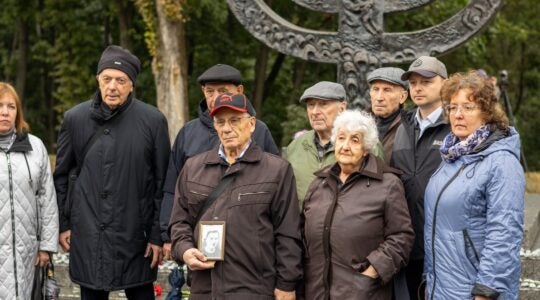(JTA) — Berlin’s mayor, many local Jewish leaders agree, could do more to counter the city’s vocal BDS movement.
But does that make him an anti-Semite?
A report that the California-based Simon Wiesenthal Center may include Mayor Michael Müller on its annual list of the world’s 10 worst cases of anti-Semitic activity has perplexed prominent Israel supporters in Germany.
In an interview Monday with The Jerusalem Post, Rabbi Abraham Cooper, the associate dean of the Simon Wiesenthal Center, charged that by declining to publicly oppose recent high-profile anti-Israel events in the city, Müller is “mainstreaming the BDS movement that never contributes to the daily life of Palestinians. BDS is widely recognized as anti-Semitic.”
Jewish leaders in Germany note that other cities have done more to block activities by the Boycott, Divestment and Sanctions movement targeting Israel. But they say this is no reason to put Müller in the stockades and could be counterproductive.
While it’s “embarrassing for the city of Berlin that the mayor hasn’t yet taken a clear and unequivocal position against BDS,” it is “grotesque to put him in line with former Iranian President Mahmoud Ahmadinejad and the worst anti-Semites in the world,” Joseph Schuster, head of the Central Council of Jews in Germany, said in a statement Thursday.
Though a clear stance would be appreciated, Müller “definitely does not belong on this list,” the Jewish Community of Berlin’s commissioner on anti-Semitism, Sigmount Königsberg, said in a statement Thursday. He called BDS “nothing less than the continuation of the anti-Jewish boycotts” of the 1930s in Germany.
Cooper confirmed to JTA that Müller will remain a candidate for the list until he acts to curb BDS activities in the German capital. He accused Müller of supporting the movement through inaction.
BDS “needs legitimate players to gain legitimacy,” said Cooper.
“We didn’t consult with the Jewish leaders in Berlin, and they are welcome to say and do whatever they think or feel is appropriate,” Cooper added. Müller, as mayor of a world-class city, is “impacting an ongoing global project that aims to demonize and get rid of the Jewish state.”
Initially reluctant to comment, Müller now has called the charges “absurd” and suggested a fuller response would come.
The insinuation of anti-Semitism impacts the entire Berlin government, Müller told the Berliner Zeitung on Wednesday.
“Especially in a city like Berlin, we are aware of the special responsibility” of Germans given their history, he said.
Others have defended Müller, including Bundestag member Volker Beck, former head of the body’s German-Israeli Parliamentary Friendship Group; Elio Adler, founder of a nonpartisan Jewish political initiative in Berlin; and Sergey Lagodinsky, a member of the Berlin Jewish community assembly of representatives.
“We have enough real problems in the field of anti-Semitism,” Lagodinsky told JTA. “Including the mayor in the list for no obvious reason discredits all the critical work we do to keep the issue alive. This is irresponsible.”
“One can and must criticize Müller’s too mild course in dealing with conservative or political Islam, but to attribute to him anti-Semitic motives in doing so is wrong and unfair,” Adler told JTA, adding that any judgment of Müller should come from Berlin and not from Los Angeles. “Adding him weakens the relevance of this list.”
They noted that Müller had made clearly pro-Israel statements as the state leader of the Social Democratic Party, and that state culture senator and fellow party member Klaus Lederer had called the BDS movement “disgusting.”
In addition, throughout his political career and especially as mayor, Müller “has repeatedly proved his friendship and his deep connection with the Jewish community and with Israel,” Robbe and Hizarci said. “So it’s not at all understandable to have this accusation hanging over him.”
The BDS movement in Berlin recently called for a boycott of an international pop festival in the city when it emerged that the Israeli Embassy had contributed about $600 to cover the costs for some performers. Several bands from Arab countries dropped out of the event.
In June, after BDS activists disrupted an event with a member of the Israeli parliament and an Israeli survivor of the Holocaust at Berlin’s Humboldt University, the chair of Israel’s Yesh Atid party, Yair Lapid, blasted the mayor for giving anti-Israel activists “the freedom of the city.”
The Tagesspiegel reported that the Wiesenthal Center wants Müller to bar the annual anti-Israel, pro-Iran Al-Quds demonstration, which takes place in early August.
Local authorities allow political demonstrations while setting boundaries as to what can be said or displayed by participants — boundaries that are not always easily enforced.
In response to a Jerusalem Post article from June, the Israeli Embassy clarified that it was critical of anti-Zionist events in Berlin and “not [of] the mayor or the Berlin Senate.”
Cooper agreed that there are enough anti-Semites in the United States alone to “fill half of this year’s top 10” and “there is not exactly going to be a shortage.” But a world-class city has to set an example, he added.
“In other cities there has been leadership to fight” BDS, Cooper told JTA. “The mayor should know better and do something about it. It’s not too late. Is he going to facilitate the BDSers or derail them?”
The center’s annual list is neither scientific nor definitive, and tends to read as an annual survey of trends in anti-Semitic and anti-Israel activity. Still, observers take notice.
In 2013, the Simon Wiesenthal Center came under criticism for including remarks by German journalist Jakob Augstein on its annual list. The then-head of the Central Council of Jews in Germany, Dieter Graumann, agreed that Augstein wrote “horrible, hideous” articles on Israel, but said his inclusion trivialized all the others on the list.
JTA has documented Jewish history in real-time for over a century. Keep our journalism strong by joining us in supporting independent, award-winning reporting.






